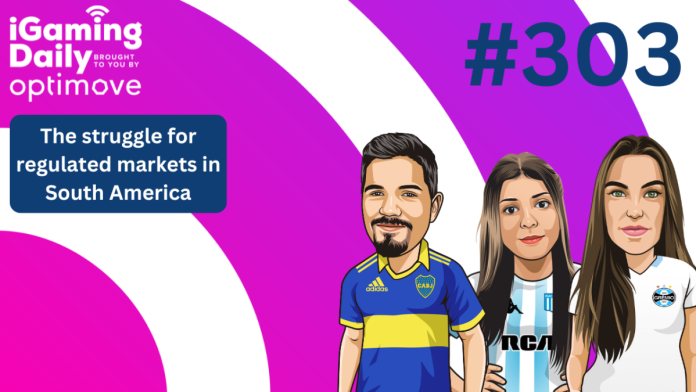In Argentina, official data has revealed that 80% of bets placed online are placed illegally with unlicensed companies compared to just 20% with regulated operators.
Isadora Marcante, Senior Journalist at SBC Noticias is joined by her fellow Senior Journalist, Fernando Noodt, and the Editor of SBC Noticias, Lucía Gando on iGaming Daily, supported by Optimove, to discuss the concerning figures and what authorities, and even the Catholic Church, are doing to crack down on illegal and underage gambling in South America.
In Argentina, every province is responsible for regulating its own online gaming market, and Fernando explains that many regions established regulatory frameworks following the explosion of igaming and online sports betting during the COVID-19 pandemic.
Despite the introduction of regulation, many unregulated operators are still active and operating without the same restrictions placed on legal operators. This includes marketing to underage gamblers as illegal operators don’t run background checks.
On the data, Isadora said: “80% is a very high percentage. Underage gambling, I would say it’s a cancer in the industry especially because we have a very high amount of fraudulent companies and fraudulent operators operating not only in Argentina but in other countries in Latam and in Brazil as well.”
The trio then move on to discuss what is being done by legislators to combat the problem.
The province of Buenos Aries has launched a problem that is directly focused on studying the issue and also treating underage and problem gambling. The province has already found that almost 40% of teenagers have made at least one bet.
The City of Buenos Aires has also decided to stop granting licenses to new operators in the jurisdiction to try to combat the problem which was discussed in a previous episode of iGaming Daily with the SBC Noticias team.
The issue of the unregulated gambling market has also had an impact on the perception of the regulated gaming among the Argentinian population, as people are unable to tell the difference between the two when legal operators are advertising on TV and at sporting events.
“[People] start worrying about all these campaigns and all this advertising so people tend to put them in the same bag as illegal operators which are the chosen destination for minors who look to place bets,” explained Fernando.
“Considering the marketing push from regulated companies and the unethical behaviour of the unlicensed ones, people, lawmakers and different segments of society have been turning against the industry more and more every day, every week, every month. You keep seeing more and more people talking against the industry.”
He adds that even the Catholic Church in Argentina has released a statement calling for measures to be put in place to help solve the problem.
To end the episode, the show shifts focus to Uruguay to examine the news that the Central Bank of Uruguay has extended its regulatory framework against unauthorised online igaming and sports betting transactions.
Lucía said: “The measure already applied to formal banks but will now also impact independent platforms. They will have to face the same restrictions as formal banks in regard to international transactions and payment options to gaming operators. Under the new regulation, these platforms will not be able to approve international and local transactions to igaming and sports betting platforms.”





